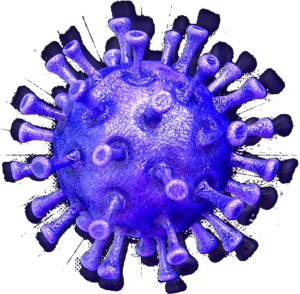
HOW DOES THE JET GREEN™ TECHNOLOGY KILL COVID-19?
All organic matter has a thermal death point. That means that there is a temperature at which all organisms will be killed by heat either instantaneously or within a finite period of time. The Jet Green™ Micro Turbine System which was originally designed for effective mold treatment is equally effective at virus decontamination. GETI has a long list of successful mold projects, including West Point Military Academy, the United States Coast Guard, Apartment Complexes, University Student Housing Complexes, Hospital Facilities, and facilities for victims of Hurricanes Harvey, Michael and Maria. Our treatment approach is driven by the type of mold species present, therefore our treatment heat ranges between 150 degrees to 180 degrees Fahrenheit for a time period of up to 3 hours. Viruses are documented to be KILLED under lower temperatures and shorter time durations. When targeting the EBOLA Virus, it may take up to 1 hour of heat treatment at a temperature of 140 degrees Fahrenheit to kill the virus (Mitchell 1984, Anelich 2014). The COVID-19 can be effectively killed within 30 to 45 minutes depending on the temperature, with ranges from 131 degrees to 140 degrees Fahrenheit (Gerba 1997, Laude 1981, Larkin 1977).
The Jet Green™ Micro Turbine System is a non-chemical solution to complete COVID-19 decontamination. A single unit can treat up to 4,000 square feet in one hour. The system is mobile and can be reconfigured quickly with a small field to continual treat new spaces in a 24-hr cycle.
References:
Anelich, L., and Moy, G.G (2014). Ebola Virus Disease (EVID): Important Aspects for the Food Science and Technology Community. IUFoST Scientific Information Bulletin. Available at: http://www.iufost.org/iufostftp/IUFoST%20SIB%20 %20-%20Ebola%20Virus%20Disease%20update%201.pdf [accessed March 12, 2015].
Larkin, E.P. (1977). “Thermal Inactivation of Viruses”. United States Army Natick Research and Development Command. Food Sciences Laboratory.
Gerba, C.P. et al. (1997). “Evaluation of Microbial Removal/Inactivation by the Innowave 240®”. Dept. of Soil, Water and Environmental Science, Univ. of Arizona. Tucson, AZ
Laude, H. (1981). “Thermal Inactivation Studies of a Coronavirus, Transmissible Gastroenteritis Virus”. Journal of General Virology. Volume 56: Issue2.
Mitchell, S.W. and McCormick, J.B. (1984). “Physicochemical Inactivation of Lassa, Ebola, and Marburg Viruses and Effect on Clinical Laboratory Analyses”. Journal of Clinical Microbiology, September, p. 486-489.
